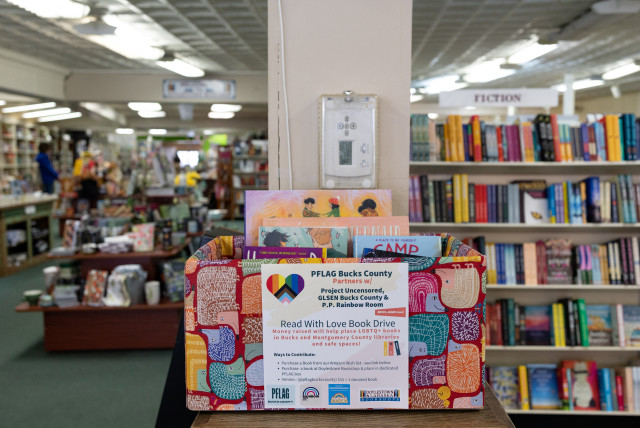Literature celebrates nuance. So why does the book world feel so one-sided on Israel?

Erika Dreifus recounts their longstanding observation of anti-Israel sentiments within literary circles, specifically addressing recent controversies at the NBCC award ceremony and following dilemma
(JTA) — For many people in literary spaces, the waves of anti-Israelism since October 7 and the outbreak of the Israel-Hamas war - whether fueled by ignorance, misinformation or malicious antisemitism - have come as a surprise, and the dilemmas of ongoing participation are similarly new.
Not so for me. I’ve been watching this poison spread through my professional communities for nearly two decades. Which is how I now find myself back where I was some 18 years ago, wondering what to do about my membership in the National Book Critics Circle.
According to its mission statement, the NBCC “honors outstanding writing and fosters a national conversation about reading, criticism, and literature.” Such goals appealed to me in 2006, when, as a 30-something “emerging writer” who was building a book-reviewing practice, I submitted my credentials to join and paid the membership fee.
Then came the Second Lebanon War in 2006. As I read and worried about Israelis from afar, the organization’s then-president was using his bullhorn on the board-controlled blog to inveigh against Israel. When I commented publicly on a number of the posts and reached out privately to the few people I knew in the organization, I received virtually no support.
Later that same year, the president ratcheted up his rhetoric by repeatedly spotlighting Jimmy Carter’s notorious “Palestine: Peace, Not Apartheid” and then embarked on a harassment campaign via phone and email (asking me, in one memorable missive, how I felt about the IDF targeting women and children for murder).
I decided that I’d had enough. I resigned my membership.
Reflecting on NBCC's controversial remarks
Years passed. The organization had new leadership. At some point, that original blog disappeared. I was still writing about books. I decided to give the NBCC another try. I never sought any especially significant role there, but I did contribute to the (revamped) blog. I voted in elections, albeit irregularly. Occasionally, I attended events, including the annual awards ceremony, which routinely earns national press coverage.
I did not attend the most recent such ceremony, which was held March 21 in New York. But the following day a colleague told me that the “genocide” in Gaza had been a focus of introductory remarks and subsequent acceptance speeches.
I saw no mention of this aspect of the event in the press coverage that I encountered. But as I watched a recording of the event, the years fell away. I wondered how I might have reacted in the moment had I been a member of the audience. And I wondered how to respond this time.
What did the recording reveal? The NBCC’s vice president for awards, Keetje Kuipers — who is also listed on the organization’s website as vice president for diversity, equity and inclusion — was the first speaker to invoke what she termed “the continued genocide unfolding in Palestine.” No sooner had she uttered those words than applause broke out from the audience.
But Kuipers wasn’t finished. Citing the work of two poets of Jewish heritage — Jane Hirshfield and the late Adrienne Rich — Kuipers called for an expansive understanding of the collective “we” as she continued to her conclusion, exhorting those gathered “to do the work of expanding compassion on the page, and in the world, and that ‘we’ includes the Palestinian people. Let it be what we say and do tonight as we gather together to celebrate the power of words.”
Absent from these powerful words: any mention of Oct. 7, Hamas, or the more than 100 hostages still captive in Gaza. Absent was any audible disagreement from the crowd to the reference to the “genocide unfolding in Palestine.”
Two award winners used their acceptance speeches to express similar sentiments, notable also for their erasures. Safiya Sinclair, who took the autobiography prize for her memoir “How to Say Babylon,” suggested that her Rastafarian background informed her views:
As a daughter of Rasta rebellion, I know that none of us are free until all of us are free … which means we wish to see all downpressed people free from the shackles of colonial violence. I pray for an end to the genocide in Gaza and I wish to see a free Palestine in my lifetime, a free Sudan, a free Haiti, a free Congo.
Roxanna Asgarian, winner in nonfiction for “We Were Once a Family: A Story of Love, Death, and Child Removal in America,” concluded her acceptance speech as follows:
This book is about what can and does happen when our systems and our government place less value on certain children’s lives than on others. Because of that, I want to add to the chorus of people demanding a permanent ceasefire and an end to the inhumane conditions in Gaza. Every child deserves to survive and thrive, their inherent dignity intact. Thank you.
Navigating controversies in literary spaces
Asgarian did not include among those children the Bibas boys, kidnapped with their parents from Kibbutz Nir Oz on Oct. 7 (Kfir was then 9 months old; big brother Ariel, 4), and now, six months later, are still held hostage in Gaza. If she was aware of the varieties of trauma inflicted on Israeli children on October 7 and beyond, or the Israeli children who witnessed their parents being slaughtered in their own homes, or the tens of thousands of displaced families from the communities attacked on Oct. 7 and those to the north under threat from Hezbollah, she didn’t mention them.
I can’t be certain what I would have done in the moment, had I been part of the audience. Surely, I wouldn’t have applauded Kuipers’, Sinclair’s, or Asgarian’s speeches. Had I attended the customary after-party, I might have angled for a moment with another awardee, Marion Winik.
After congratulating her for the NBCC Service Award she received for her longtime engagement and leadership, I might have thanked her for her speech’s concluding line: “Long live the NBCC, and peace in the Middle East,” the evening’s only other - and most benign and compassionate - reference to the war.
Winik’s speech also referenced the advances in diversity and inclusion that the NBCC had made since the fraught moment after the police murder of George Floyd in 2020. Those efforts make these resuscitated echoes of my earlier NBCC experience all the more distressing.
This week I emailed NBCC with my concerns, saying that I was writing about the ceremony and that I hoped the one-sided remarks made there “were not a sign of more worrisome developments to come.” Heather Scott Partington, president of the NBCC, thanked me for my email and said she would “share your thoughts and concerns with the rest of the board.”
I have been tracking resolutions and statements by literary organizations that are compromised by both distortions of the historical record and ongoing demonization of the state of Israel, Israelis, and/or the vast majority of Diaspora Jews who are not anti-Zionists. Many of us are grappling with how this growing toxicity over Israel should shape our own participation in the larger community.
Sometimes, the question boils down to this: Assuming that our own commitment to Jewish peoplehood or Israeli citizenship doesn’t automatically exclude us, do we even want to remain part of literary spaces that clearly don’t welcome us as our full selves?
How much effort are we able and willing to expend - and how many times - trying to explain and educate those who simply aren’t aware of the harm that’s being caused? And what do we do in those cases where no amount of explanation or education can overcome sheer anti-Israel antisemitism?
I still haven’t decided whether I’ll renew my NBCC membership when the dues invoice arrives. But this much is certain: These circumstances aren’t limited to me and the NBCC. The questions and dilemmas remain - and will, I suspect, grow only more acute - for other writers, regarding other organizations, too.
The views and opinions expressed in this article are those of the author and do not necessarily reflect the views of JTA or its parent company, 70 Faces Media.
Jerusalem Post Store
`; document.getElementById("linkPremium").innerHTML = cont; var divWithLink = document.getElementById("premium-link"); if (divWithLink !== null && divWithLink !== 'undefined') { divWithLink.style.border = "solid 1px #cb0f3e"; divWithLink.style.textAlign = "center"; divWithLink.style.marginBottom = "15px"; divWithLink.style.marginTop = "15px"; divWithLink.style.width = "100%"; divWithLink.style.backgroundColor = "#122952"; divWithLink.style.color = "#ffffff"; divWithLink.style.lineHeight = "1.5"; } } (function (v, i) { });

